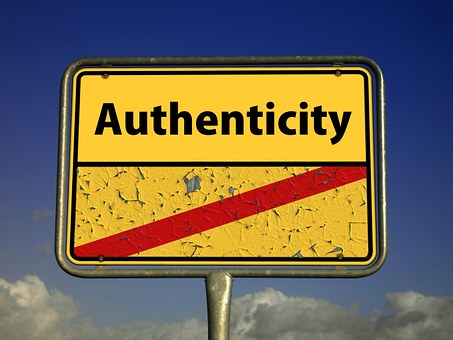After working on his elevator speech, the client still wasn’t expressing himself. It was a good message-clear and concise. When asked why he was resistant to using his new words, he said he felt inauthentic. Bingo! Nobody wants to listen to a talking head. And most public speakers don’t want to sound scripted. It doesn’t matter how eloquent the words, if the message isn’t coming from a place that’s real. Audiences (whether they be an interviewer, a gathering of networkers or a large group) want a connection with the presenter. In order to know, like, and trust the speaker they must be able to relate not only to the message but to the messenger. And that means being authentic.
Being real is not about being what you think the audience wants. Politicians make this mistake all the time when they pander to their constituents. A recent example of this was when Senator Elizabeth Warren did an Instagram live presentation. In an attempt to connect with the people, she tried being more informal. She filmed from her kitchen, introduced herself and said, “Hold on a sec, I’m gonna get me a beer.” She left the kitchen for a moment, returned and took a swig of beer. She then invited her husband to join her for a brew. He declined the drink but entered the kitchen. She took a second sip and then started announcing the names she saw on her Instagram feed. Was it a joke? Only she knows. But it didn’t feel authentic. The beer appeared to be a prop to communicate that she was one of us. It didn’t work. It wasn’t consistent with her typical style and image. It would have been more believable had she said,
“Hi. I’m Elizabeth Warren and I’m running for President. Meet my husband. I’d like to get to know you so please post your comments so we can have a dialogue. I want to know what’s on your mind”.
When a public speaker or public figure panders to the audience, it creates a wall. Audiences are more sophisticated than ever and can tell when the presenter is performing. The listeners want to connect and the best way to create a connection is to go beyond performance to being authentic. Why don’t more public speakers speak from the heart? Fear. Because the key to authenticity is vulnerability. University Professor and keynote speaker, Brene Brown, says “Because true belonging only happens when we present our authentic, imperfect selves to the world, our sense of belonging can never be greater than our level of self-acceptance.”
I learned this lesson by accident. I was speaking at a women’s lunch meeting about creating presence on the platform. It was my typical content. I rehearsed the night before and was well-prepared. And then I had a real moment. In a moment of spontaneity, I shared a story when I was down and out and trying to make a career change. I told the group that after no success, one night I surrendered and asked God to find me a new job and get me “out of there”.
After the presentation, women came up to me and said they really resonated with that story. They were amazed that I would say the God word. They wanted to know if I would say that in a corporate setting. As prepared and polished as I was, it was that instance of shared vulnerability that resonated with the group.
And it’s not limited to public speaking. Social media is a presentation. Most of the time experts including myself, promote their successes. I would post pictures and videos of awards, events, and meetings with high profile brands.
Then when my sister passed in 2018, I did a facebook live video of the military memorial service. It was for my family and friends on the East Coast so that they could be there virtually. When her tombstone was ready I took a picture of it, once again to show people who couldn’t be there. What surprised me was that these events had the greatest engagement and longest facebook feeds. The comments were a great source of comfort. The posts truly resonated with the audience-friends and strangers, international and local contacts. I was no longer the professional speaker, expert, or author. My expertise didn’t matter but my humanity did.
When we hide behind content and performance we create a barrier between ourselves and the audience. Listeners want to connect with the speaker. Being vulnerable is not weakness. It takes great courage to be who we are. That connection happens when we share our experience, insights, failures and successes. Instead of rejection, the audience will embrace you. It’s in the sharing that they see themselves and know it’s okay to be who they are. You are the message. So share your story. Be vulnerable, be authentic, be you.

